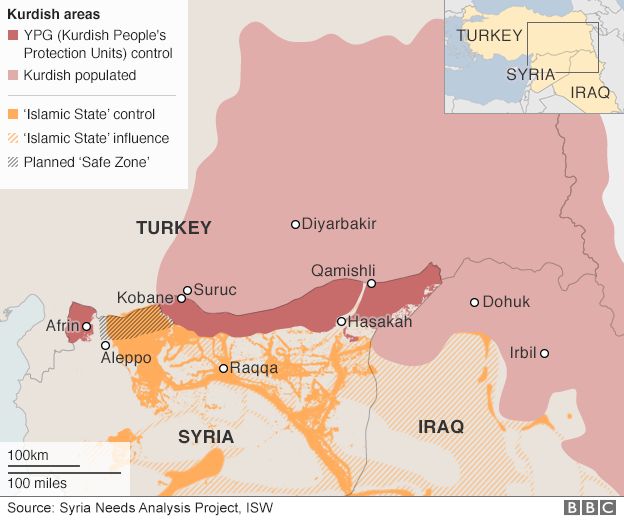Turkey PM: Syria no-fly zone needed

The Turkish prime minister has told the BBC that Turkey will push again for a no-fly zone over northern Syria to protect civilians fleeing both Islamic State and Syrian government forces.
Ahmet Davutoglu said he would work with the US to establish a "safe area" for people displaced by Syria's conflict.Mr Davutoglu did not rule out sending Turkish troops in to protect the area.
Turkey is home to more Syrian refugees than any other country - more than 1.8 million according to recent UN figures.
In a wide-ranging interview with the BBC's Jeremy Bowen, Mr Davutoglu called on the international community to do more to resolve the four-year conflict in Syria and denied that Turkey had helped so-called Islamic State and other extremist groups.
He criticised the five permanent members of the UN Security Council for failing to make a "strong decision" to stop the atrocities in Syria.
Asked whether Turkey was doing enough to prevent the large numbers of migrants reaching Europe though his country, he said it was the responsibility of the international community to stem the flow of migrants by bringing the four-year conflict in Syria to an end.
Despite not ruling out the use of Turkish ground troops, Mr Davutoglu said he preferred to strengthen Syria's moderate opposition.
"If there is enough power of moderate forces in Syria, there will not be any necessity for other countries including Turkey to send any ground troops," he said
Analysis: Jeremy Bowen, Middle East Editor
Turkey's Prime Minister Ahmet Davutoglu argues that the bloodshed in Syria is still out of control because of a simple fact of international life: the five permanent members of the UN Security Council are paralysed when it comes to dealing with Syria's war. They haven't been able to agree a single course of action.When he was foreign minister, Mr Davutoglu was praised for a policy based on the idea that Turkey should have no problems with its neighbours. But the collapse of much of the Middle East into violence means the Turks face challenges wherever they look.
They are struggling most with fall-out from the Syrian war, in which Turkey is deeply involved. The war has converged with the much older fault line between the Turkish state and Kurdish separatists. It's another example of how the Syrian war is making existing problems much worse.
A ceasefire in Turkey's long-running conflict with the group disintegrated in July, when a suicide bombing blamed on IS killed 32 people in the predominantly Kurdish town of Suruc.
The PKK's military wing killed two Turkish police officers, claiming they had collaborated with IS in the bombing, and in response Turkey began bombing PKK camps in northern Iraq at the same time as launching air strikes on IS militants in Syria.
More than 50 people are thought to have been killed in Turkey in violence linked to the PKK since the current crisis began. The number of PKK militants killed in Turkish air strikes is unknown, but unconfirmed reports in Turkish media said that 190 were killed and more than 300 injured in two major strikes in Turkey and northern Iraq in July.
Turkey launched a fresh round of air strikes in the south-east of the country on Tuesday as the PKK said it was behind Monday's bombing of a police station in Istanbul.
Turkish President Recep Tayyip Erdogan said the country would continue to fight the PKK "until not one terrorist is left within our borders" and "until concrete is poured" over the separatists' weapons.
Mr Davutoglu denied that Turkey was at war with the Kurds, arguing instead that the country was retaliating against a terrorist group.
"You can not say if al-Qaeda attacks Britain it is a war between Britain and al-Qaeda. This is a terrorist attack," he said.
"No government, neither European or American democratic government can tolerate a group which is calling people for rebellion against the legitimate government," he added.
The PKK is regarded as a terrorist group by many Western countries, including the US and the UK.
More than 40,000 people have been killed since the PKK began its armed struggle against the Turkish government in 1984. In the 1990s, the organisation dropped its demand for a Kurdish state and instead called for more autonomy for the Kurds.
But Mr Davutoglu has said since the recent resumption of violence that air strikes against the group will continue until it surrenders.
The leader of the PKK, Cemil Bayik, told the BBC on Sunday that he believed Turkey wanted IS to succeed in order to prevent Kurdish gains. Kurdish fighters - among them the PKK - have secured significant victories against IS militants in Syria and Iraq.
Turkey's battle with the PKK is complicating the US-led war on IS, for which the US has relied heavily on Syrian Kurdish fighters affiliated with Turkey's Kurdish rebels.
Turkey has been accused, along with Saudi Arabia and Qatar, or supporting jihadist elements in Syria in the early stages of the formation of IS.
Mr Davutoglu rejected the accusation, telling the BBC Turkey had never supported IS or other extremist groups such as al-Nusra.
"No. Never. Never. Never. We supported only those who escaped from Assad's atrocities - chemical weapons, barrel bombs," he said.
"This is an unfair assessment and accusation against Turkey which there is no ground at all. If there is anybody who has a proof for this, they should put this on the table."


0 Comments:
Post a Comment
Subscribe to Post Comments [Atom]
<< Home